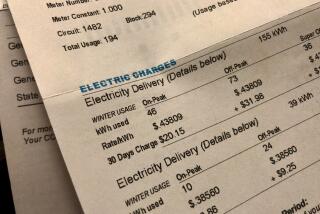Support Surges for Electricity Reliability
- Share via
WASHINGTON — As Congress opens hearings today into the cause of last month’s Northeast power blackout, one outcome is likely to be a surge of support for a measure designed to make the nation’s electric transmission grid more reliable.
The North American Electric Reliability Council, an industry organization established after the 1965 Northeast blackout, has for several years asked Congress to give it the power to set and enforce reliability standards, such as the authority to fine utilities that overload transmission lines.
While it is unclear whether any violations of voluntary rules contributed to the Aug. 14 outage, reliability legislation is emerging as one of Capitol Hill’s principal responses to the nation’s worst blackout.
“The blackout has made it more important for politicians on both sides of the aisle to pass something they can point to as evidence that they ‘did something’ to address electricity problems,” said Jerry Taylor, director of natural resource studies for the Cato Institute, a nonprofit public policy research foundation in Washington.
At a House Energy and Commerce Committee hearing today, officials from the Bush administration and industry are expected to press for passage of the reliability legislation. The hearing comes as House and Senate negotiators begin talks on the first overhaul of energy policy in more than a decade, a bill that includes provisions to strengthen the grid.
Lawmakers plan to question government and industry officials in a bid to understand just what went awry Aug. 14, when a power failure swept through the Northeast and the Midwest, leaving millions without electricity and causing billions of dollars in losses.
“The grid is designed to handle multiple disturbances without going down,” said Ken Johnson, a spokesman for Rep. W.J. “Billy” Tauzin (R-La.), the committee chairman. “But clearly, for whatever reason, the system failed. We believe it’s important to determine what options were available to relieve overloading short of throwing 50 million Americans into the dark.”
Today and Thursday, lawmakers will press witnesses for a precise timeline and explanations of what sparked the debacle and why it was not contained to a much more limited area.
“A full understanding of exactly what happened will take time,” H. Peter Burg, chairman and chief executive of Ohio-based FirstEnergy Corp., said in a letter to the committee in advance of his testimony. Some of FirstEnergy’s power lines were among the first to fail.
But Anthony F. Early Jr., chairman and chief executive officer of Michigan-based DTE Energy, said in a letter to the committee that power plant outages and transmission lines failures in Ohio were the “triggering events for the blackout.”
A “significant contributing factor” for the cascading effect was a “failure to coordinate and cooperate ... ,” he said, complaining that Michigan utilities did not have “timely or adequate warnings about deteriorating system conditions in Ohio.”
“There’s some finger-pointing going on,” observed a congressional staffer.
Investigators may never be able to pinpoint responsibility for the blackout to the actions of one person. Responsibility for providing electricity in the Northeast has been divided among various entities since the advent of deregulation in the 1990s.
“To say that ‘this guy’ made a mistake -- and his mistake caused the whole thing -- that’s the part that’s going to be virtually impossible,” said Frank A. Wolak, an economist and energy specialist at Stanford University.
Wolak compared the search for blame in the Northeast to the search for an explanation of the Western energy crisis in 2000 and 2001. While gaming by energy traders, flaws in California’s marketplace and a shortage of power all played a role in the Western woes, assigning precise degrees of blame remains a matter of bitter dispute.
Similarly, Wolak said, investigators armed with data about the Northeast blackout face a daunting task of assessing actions by generators, operators involved in transmitting electricity and managers who oversee the grid. “It’s possible to point fingers all the way around the room and never get back to the same person,” he said.
Congressional investigators say they can’t say whether there was human error but believe that the problems were more likely due to a system “just so antiquated it could not respond.”
Deregulation is increasingly seen as putting stress on the grid system, as energy flows back and forth for trading purposes and companies perceive few incentives to build lines that could be shared by others. The reliability legislation would create a self-regulatory organization to oversee the rules of the grid under the oversight of the Federal Energy Regulatory Commission.
Rep. John D. Dingell of Michigan, the top Democrat on the House Energy and Commerce Committee, on Tuesday urged his colleagues to break out the reliability legislation from the energy bill to keep it from falling victim to partisan and regional fights over other energy issues.
But Tauzin’s spokesman Johnson said, “We do not believe America can meet its future energy needs by addressing our problems in piecemeal fashion.”
More to Read
Sign up for Essential California
The most important California stories and recommendations in your inbox every morning.
You may occasionally receive promotional content from the Los Angeles Times.














